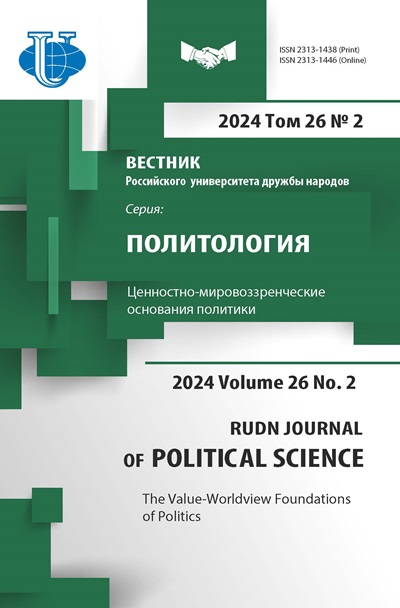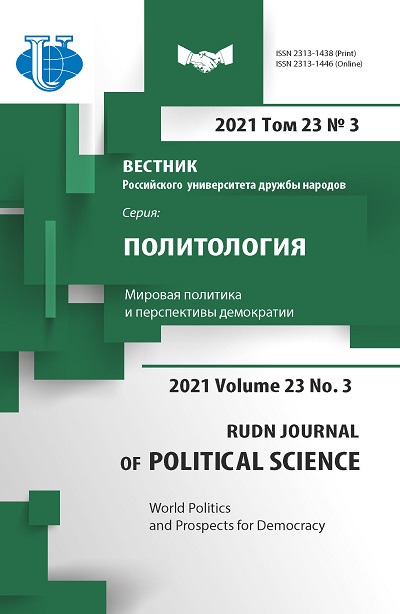Вызовы для лидерства в международных отношениях будущего
- Авторы: Храбина Д.1
-
Учреждения:
- Московский государственный институт международных отношений (университет) Министерства иностранных дел Российской Федерации
- Выпуск: Том 23, № 3 (2021): Мировая политика и перспективы демократии
- Страницы: 407-423
- Раздел: МИРОВАЯ ПОЛИТИКА И ГЛОБАЛЬНОЕ ЛИДЕРСТВО
- URL: https://journals.rudn.ru/political-science/article/view/27306
- DOI: https://doi.org/10.22363/2313-1438-2021-23-3-407-423
Цитировать
Полный текст
Аннотация
В статье рассматриваются структурные трансформации в контексте многополярности и глобальных изменений: климата, промышленной революции 4.0 и пандемии, как явлений, которые будут определять будущее поколение политических лидеров. Автор работает с неоклассическим реализмом как с основной парадигмой, которая позволяет ему оценивать как структурные сдвиги, так и качество политического истеблишмента на уровне отдельных единиц. В статье используются как качественные, так и количественные (индекс национальных возможностей и сравнение собранных данных) методы. Основная цель статьи - определить масштабы воздействия текущих вызовов на будущих политических лидеров. Гипотеза исследования состоит в том, что будущие лидеры будут в значительной степени сформированы сдвигом к многополярности, в которой международные дела будут определяться логикой баланса сил. В то же время будущим политическим мыслителям предстоит иметь дело с глобальными чрезвычайными ситуациями, вызванными климатическим кризисом, пандемиями и промышленными революциями 4.0 и 5.0.
Ключевые слова
Об авторах
Джозеф Храбина
Московский государственный институт международных отношений (университет) Министерства иностранных дел Российской Федерации
Автор, ответственный за переписку.
Email: Hrabina.consulting@gmail.com
ORCID iD: 0000-0003-4335-2172
аспирант кафедры прикладного анализа международных проблем, приглашенный преподаватель Института международных отношений и управления МГИМО МИД России
Москва, Российская ФедерацияСписок литературы
- Acharya, A. (2018). The end of American world order. Cambridge (GB): Polity Press.
- Allison, G.T. (2020). Destined for war can America and China escape Thucydides’s trap? Melbourne: Scribe.
- Bristow, J. (2020). Post-Brexit boomer blaming: The contradictions of generational grievance. The Sociological Review, 69(4), 12-24, doi: 10.1177/0038026119899882
- Bull, H., & Watson, A. (2020). The expansion of international society. Oxford: Oxford University Press.
- Bull, H., Hoffmann, S., & Hurrell, A. (2012). The anarchical society a study of order in world politics. New York: Palgrave.
- Dahl, R.A. (1959). The concept of power. Indianapolis: The Bobbs-Merrill comp.
- Doyle, M. (1996). Liberalism and World Politics. The American Political Science Review, 80(4), 1151-1169. doi: 10.2307/1960861
- Fukuyama, F. (1989). The end of history and the last man. London: Penguin Books.
- Ikenberry, G. (2014). Power, order, and change in world politics. Cambridge University Press.
- Ikenberry, G. (2018). The end of liberal international order?, International Affairs, 94(1), 7-23, https://doi.org/10.1093/ia/iix241
- Gerring, J., Oncel, E., Morrison, K., & Pemstein, D. (2019). Who rules the world? A portrait of the global leadership class. Perspectives on Politics, 17(4), 1079-1097. https://doi.org/10.1017/ s1537592719000744
- Higley, J. (n.d.). Elites. In Encyclopedia Britannica. Retrieved May 13, 2021, from https://www.britannica.com/topic/elite-sociology
- Kissinger, H. (2005). Diplomacy. Simon & Schuster.
- Lasswell, H.D., & Lerner, D. (1980). World revolutionary elites studies in coercive ideological movements. Westport, CT: Greenwood Press.
- Lebedeva, M. (2007). World politics. Moscow: Aspect Press. (In Russian)
- Lo, B. (2015). Russia and the new world order. London: Chatham House.
- Mearsheimer, J.J. (2014). The tragedy of great power politics. New York: W.W. Norton & amp; Company.
- Mearsheimer, J.J. (2018). Great Delusion: Liberal Dreams and International Realities. Yale University Press.
- Miller, E., Gusmano, M., & Jones, D. (2018). Aging policy in the Trump era. Innovation in Aging, 2, 630-630. 10.1093/geroni/igy023.2351.
- Monteiro, N.P. (2012). Unrest assured: Why unipolarity is not peaceful. International Security, 36(3), 9-40. doi: 10.1162/isec_a_00064
- Morgenthau, H.J., & Thompson, K.W. (2018). Politics among nations: The struggle for power and peace. New Delhi: Kalyani.
- Pleyers, G. (2010). Alter-globalisation: Becoming actors in a global age. Cambridge: Polity Press.
- Podesta, J. (2019). The climate crisis, migration, and refugees. Retrieved November 29, 2020, from https://www.brookings.edu/research/the-climate-crisis-migration-and-refugees/
- Rosencrance, R. (1966). Bipolarity, multipolarity, and the future. Journal of Conflict Resolution, 10(3), 314-327.
- Singer, J.D., Bremer, S., & Stuckey, J. (1972). Capability Distribution, Uncertainty, and Major-Power War, 1820-1965. In Peace, War and Numbers. M. Beverly Hills: Sage.
- Schwab, K. (2018). The Fourth industrial revolution (Industry 4.0) A social innovation perspective. Tạp Chí Nghiên Cứu Dân Tộc, (23). doi: 10.25073/0866-773x/97
- Soh, C., & Connolly, D. (2020). New frontiers of profit and risk: The Fourth industrial revolution’s impact on business and human rights. New Political Economy: 1-18. https://doi.org/ 10.1080/13563467.2020.1723514
- Steger, M., & Wilson, E. (2012). Anti-globalization or alter-globalization? Mapping the political ideology of the global justice movement. International Studies Quarterly, 56(3), 439-454. Retrieved November 30, 2020, from http://www.jstor.org/stable/23256797
- Turner, S. (2009). Russia, China and a multipolar world order: The danger in the undefined. Asian Perspective, 33(1), 159-184. Retrieved May 13, 2021, from http://www.jstor.org/stable/42704667
- Waltz, K. (1979). Theory of International Politics. Columbia University. Waveland Press
- Wendt, A. (1999). Social theory and international politics. Cambridge: Cambridge University Press
- Wilkoszewski, H., Loichinger E., & Dick (2016). Turning the tables: policy and politics in an age of ageing. Population & Policy Bites, Blog post, 18 October 2016
- Wohlforth, W.C. (1999). The Stability of a Unipolar World. International Security, 21(1), 5-41
















